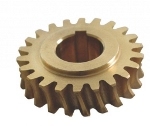Back to the home page

When do you need a new computer? And how do you buy one for as little money as possible? Two important questions. Because although computers have become much cheaper, they still cost a lot of money. Which can't easily be spended, especially in times of personal economical crisis.
So: how to survive these hard times, while staying up to date with your hardware?
Replace Windows 7, 8 or 10 by an easy free Linux
The end of Windows 7, 8 or 10, doesn't mean you have to buy a new computer. You can simply install an easy free Linux on your old computer to replace Windows. This won't cost you a cent and will keep your computer usable for several years to come.
Switch your data to the cloud after five years, buy new after 10 years
Now to the best moment of buying. This is partly determined by the reliable life expectancy of a hard disk, which is five years.
The fastest deteriorating part of a computer, is probably the hard disk. Hard disks are built to last for three to five years. Often they last longer than that, but then you can't trust them anymore. The risk of sudden and unexpected total failure, increases quickly then.
Of course you make regular backups of the important files on an external volume (right?), but how recent is your latest backup?
To protect your important an irreplaceable files, you'll want to be able to rely heavily on your hard disk. So it's advisable to move your data to the cloud after five years of service. For example to cloud services like Google Drive and / or Dropbox, that offer a free basic edition.
The other computer parts last about 10 years. After the first five years, at the time that you make your switch to the cloud, it's best to change the operating system and pick a lightweight Linux distribution like Linux Mint Xfce. This will ensure continued acceptable performance.
After 10 years of use you'll want to buy an entirely new computer: not only because of the decreased technical reliability, but also because of the outdated technology. At that point even a lightweight Linux distribution won't offer a reasonable user experience anymore.
Peripherals
Peripherals, like display, keyboard, printer and mouse, can be used safely for more than five years. But because keyboards tend to get horribly dirty and because they don't cost much, I advise to replace the keyboard every five years. A clean keyboard is more hygienic and more pleasant to operate.
Summary: switch your data to the cloud after five years, and buy a new computer every 10 years. If you have a little more money available, then buy a completely new computer every five years.
Next: how to spend as little money as possible on a new computer?
Pick the cheapest basic model and double the RAM memory
You want to buy a new computer as cheaply as possible, and still have good performance? Then pick the cheapest basic model in the store that has a CPU with at least four cores, and double the default amount of RAM memory in it.
That way, you have the most "bang for the buck", or value for money. Plus the low expenditure allows you to replace it more easily, after five or even 10 years.
What to do with the replaced computer?
A computer that's five years old, has little remaining value... So maybe you can make some member of your family happy with it.
Put a lightweight Linux distribution on it, and it's still a usable machine. Remember to advise the new owner that he shouldn't rely too much on the hard disk, though.
But.... why not consider using it as a test machine? Such an elderly, less reliable computer is ideal for experiments with all kinds of Linux distributions. That way, you can safely test and experiment!
Is the computer over 10 years old? Then the only reasonable destination is the garbage. Note: a computer contains a lot of poisonous heavy metals. Take care that your computer garbage is being processed in an environmentally acceptable way.
Want more tips?
Do you want more tips and tweaks? There's a lot more of them on this website!
For example:
Speed up your Linux Mint!
Clean your Linux Mint safely
Avoid 10 fatal mistakes
To the content of this website applies a Creative Commons license.
Back to the home page
Disclaimer